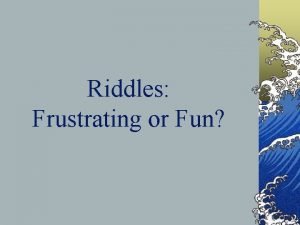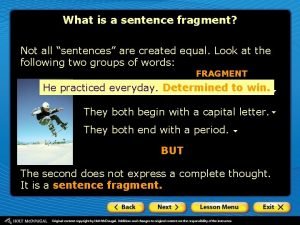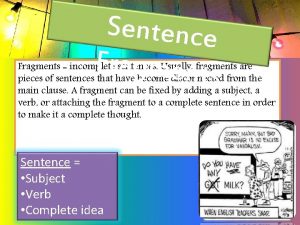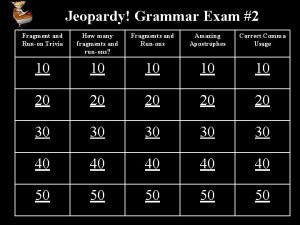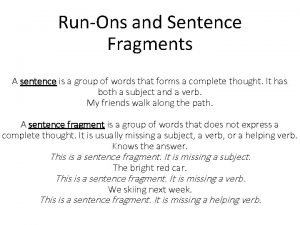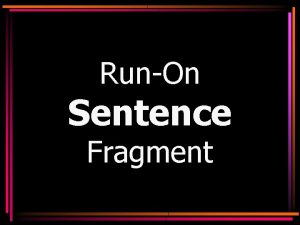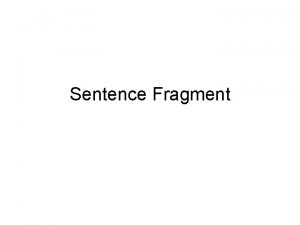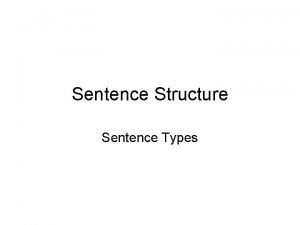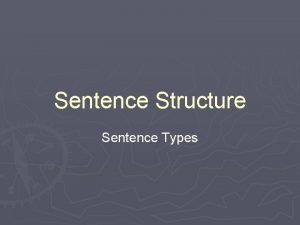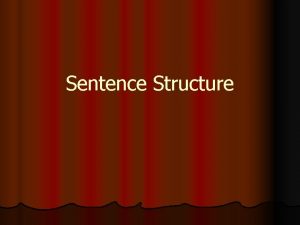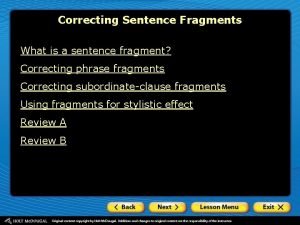The Frustrating Fragment Fragment means piece A sentence












- Slides: 12

The Frustrating Fragment

Fragment means piece! A sentence fragment is a group of words, only a piece of a sentence, pretending to be a sentence… A sentence needs 3 things: • it must have a subject • It must have a verb • it must be a complete thought. felt alone in the house is a fragment, it has no subject. She alone in the house is a fragment, it has no verb. Although he was alone in the house is a fragment, because it is not a complete thought.

What causes fragments? • • Dependent word fragments - “ing” and “to” fragments Added detail fragments Missing subject fragments

Dependent word fragment A dependent-word fragment is created when you have a dependent clause all by itself. Remember that dependent clauses are needy and must combine with independent clauses to become complete. • After her boyfriend left • Since he made his first million • Whoever opened my mail To correct them, an independent clause is needed. After her boyfriend left, she could not sleep. Since he made his first million, he’s been a snob. Whoever opened my mail is very nosy. These are no longer fragments, they are now complete sentences.

Practice correcting dependent word fragments Check the exercises on page 165 -6.

“ing” and “to” fragments Sometimes using a verb that ends in –ing or begins with “to” can result in a fragment. “He was still in the house. Trying to find his keys. ” You can correct it by putting a comma after house and making the capital letter a small one instead: • “He was still in the house, trying to find his keys. ” • Or you can add a subject to the fragment: • “He was still in the house. He was trying to find his keys. ” • A “to” fragment is similar: • “Juanita went to the store. To buy some tortillas. ” • The easiest way to fix it is to make it one sentence: • “Juanita went to the store to buy some tortillas. ”

Practice correcting –ing and to fragments Check the exercises on pages 168 -9.

“added detail fragments” An “added detail” fragment lacks a subject and a verb. They often begin with a word like: also especially except for example including such as “My car has problems. Such as, a broken windshield. ” To fix it, you can add it to the previous sentence: “My car has problems, such as, a broken windshield. Another solution is to add a subject and verb: “My car has problems. One problem with my car is the broken windshield.

Practice correcting added detail fragments Check the exercises on page 170 -1.

“Missing subject fragments” Missing subject fragments are missing a subject. Well, duh! “My dog loves to stick out his tongue. And drool all over the place. ” There are two ways to fix this fragment: • First, make it all one sentence by dropping the period and the capital letter: “My dog loves to stick out his tongue and drool all over the place. ” • Or make it two complete sentences: “My dog loves to stick out his tongue. He drools all over the place. ”

Practice correcting missing subject fragments Check the exercise on page 172.

Don’t be Frustrated by Fragments Just proofread for a sentence that is missing a subject or a verb and you are well on your way to fixing that fragment.
 Podaj oznaczenie literowe nukleozydu ktory w przedstawionej
Podaj oznaczenie literowe nukleozydu ktory w przedstawionej What does frustrating mean
What does frustrating mean Frustrating riddles
Frustrating riddles Whats a fragment sentence
Whats a fragment sentence Whats a fragment sentence
Whats a fragment sentence Topic sentence
Topic sentence Sentence fragment examples and corrections
Sentence fragment examples and corrections Whats a fragment in a sentence
Whats a fragment in a sentence Awubis words
Awubis words Commas jeopardy
Commas jeopardy Runons
Runons Fragment sentence
Fragment sentence Whats a sentence fragment
Whats a sentence fragment


